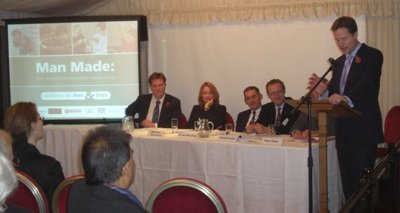My role
- About Us
COMAB launch: Public policy must understand men
The offical launch yesterday of a report by the Coalition on Men and Boys backed by the Men's Health Forum was marked by a dramatic last minute entrance from Liberal Democrat leader Nick Clegg.
According to Man Made: Men, masculinities and equality in public policy, public policy needs to respond urgently to the problems that men and boys create and the problems that they experience. This must take place alongside efforts to improve the position and status of women.

The report, funded by the Equality and Human Rights Commission and the Government Equalities Office, was launched at a meeting for MPs and Peers in the House of Lords addressed by: MHF CEO Peter Baker, who is also chair of the Coalition; Sandy Ruxton, lead author of the report; Mary-Ann Stephenson of the Womenís National Commission; and, Dr Neil Wooding, a Commissioner for the Equality and Human Rights Commission.
Danny Alexander, a Liberal Democrat MP and chair of the Liberal Democrat Manifesto Group spoke for Nick Clegg who was detained in the Commonís chamber by parliamentary protocol.
'Opening up an envelope'
However, the Liberal Democrat leader arrived hot foot shortly before the end of the meeting to declare his support for the report and his hopes that it got the 'cross-party hearing' it deserved.
 'This is a really important report,' he said. 'I don't just say this as a young man, as a father of young boys, I don't just say it as a Sheffield MP that time and time again sees young boys get snarled up in the criminal justice system, and not just because I see this systemic underperformance of young boys in schools in my own neck of the woods in that great city, but because I think you have produced a lot of very compelling research, a lot of it very chilling reading too.
'This is a really important report,' he said. 'I don't just say this as a young man, as a father of young boys, I don't just say it as a Sheffield MP that time and time again sees young boys get snarled up in the criminal justice system, and not just because I see this systemic underperformance of young boys in schools in my own neck of the woods in that great city, but because I think you have produced a lot of very compelling research, a lot of it very chilling reading too.'You are also kind of opening an envelope, if you like, in the public debate which has been closed for too long. Because of the relative advantages enjoyed by men, advantages which persist, people have been reluctant to drill below that relationship of inequality to actually highlight the fact that for some groups of men, whether it's Asian men who are discriminated against or older men who find it difficult to access health care or, of course, the systemic underperformance of young boys, particularly boys from white working class backgrounds, African Caribbean backgrounds, we're just not dealing with those parts of society enough.
'If we do that it seems to me we not only recognise their disadvantages, but we actually help, I think, to deal with a lot of the social ills that befall women in a holistic fashion.'
'I was delighted Nick Clegg made such an effort to come,' said Peter Baker. 'You don't see that everyday from politicians. I think it demonstrates his genuine commitment to this idea.'
The report looks in detail at the issues of violence, fatherhood, education, work, and health. It shows that public policy fails to engage with masculinity issues even though recent equality legislation (the gender equality duty) requires the different needs of both sexes to be taken into account.
To prevent re-offending, every local authority should have a service for men who perpetrate domestic violence, argues the report. The problems men face due to long working hours and difficult-to-access primary health services must be tackled. Fathers need more support to enable them to be fully involved as parents. Schools should do more to educate boys about the need for respect within relationships and towards women and girls.
Men themselves must take more responsibility for promoting gender equality and they have great potential to contribute positively to caring, health, education and anti-violence strategies.
'Uneven effects' of crisis in masculinity
The report's lead author Sandy Ruxton said: 'It is often argued that economic and social change has hit men and boys so hard that they are 'in crisis', but in reality the effects are highly uneven. Whilst some men continue to dominate the top jobs in business, politics, the media, the public sector and the justice system, others at the sharp end of recession - particularly those in disadvantaged groups - are facing increasing unemployment and ill-health.
'Alongside efforts to improve the position, status and pay of women at work, public policy needs to respond urgently to the inequalities between men. This should include action to limit excessive executive pay and bonuses, tackle the long hours culture, and encourage male take up of flexible working arrangements and job opportunities in non-traditional sectors.'
Neil Wooding, a commissioner at the Equality and Human Rights Commission said: 'We need to have policies that are alive to the fact that men and boys have different expectations, and different needs, from women and girls. Stereotypes around caring for children, as an example, mean that working dads can't get more involved as flexible working is given to more women than men.'
Gender Duty should 'transform public services'
He reminded the meeting of the importance of the gender duty. 'The gender equality duty should help transform public services. It puts an obligation on public authorities - from councils to NHS trusts - to collect evidence about the different experiences of the men who use their services, and take any inequalities seriously.'
 Peter Baker concluded: 'The time is now right for public policy to address men, boys and masculinity in a more sophisticated way. We can't respond effectively to the many problems men and boys cause and the problems they face unless and until there is a genuine cross-government strategic commitment to focus on masculinity in the development of public policy.
Peter Baker concluded: 'The time is now right for public policy to address men, boys and masculinity in a more sophisticated way. We can't respond effectively to the many problems men and boys cause and the problems they face unless and until there is a genuine cross-government strategic commitment to focus on masculinity in the development of public policy.'We need to tackle the long-hours working culture, improve menís use of primary healthcare, encourage services to engage more actively with fathers, and develop programmes to educate men and boys about healthy relationships to combat violence against women. Men and boys have great potential to contribute positively to strategies in these areas, and many are actively doing so. We must reach a tipping point, where the majority come to recognise the benefits - for themselves, women and children - of greater equality.'
- More on the report (and how get a copy)
- Photos: Angela Cairns, Relate
In This Section
Haringey health humour
I'd rather admit I love John Ryan!


 Donate to the MHF
Donate to the MHF
 Man MOT
Man MOT